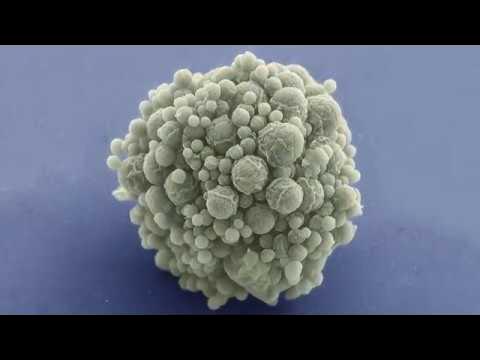What is Synthetic Biology?
Summary
TLDRThis transcript features a physicist-turned-synthetic biologist exploring how biology can be programmed like computers, using physics as a tool. With a focus on reprogramming biological systems, the speaker discusses advances in synthetic biology, from building DNA that makes bacteria blink to creating cell-based devices to treat cancer. The potential of synthetic biology extends to solving real-world problems like plastic degradation and environmental sensing. The field is accelerating, with immediate implications, and its transformative impact on medicine, materials, and the environment is already unfolding.
Takeaways
- 😀 The speaker was trained as a physicist and became fascinated with computers, leading to an interest in programming biology using the rules of physics.
- 😀 After their PhD, the speaker had an 'aha moment' about the potential of programming biology like computers.
- 😀 The field of synthetic biology was in its early stages when the speaker began working on understanding how the immune system works.
- 😀 A breakthrough in synthetic biology allowed for building DNA that could control bacteria, making them blink rhythmically when inserted into a bacterium.
- 😀 Over the past few decades, the ability to reprogram living organisms using synthetic biology has accelerated dramatically.
- 😀 Biology is unique because, in addition to programming, biological systems can produce useful substances like fuels, medicines (e.g., insulin), and enzymes for household products.
- 😀 Synthetic biology aims to use biology’s natural methods of molecule creation to produce new types of molecules that biology has never seen before.
- 😀 The speaker's lab focuses on building cell membranes from scratch in the laboratory, which surround every living organism.
- 😀 One application of synthetic biology in the speaker’s lab is using cell-based devices to treat cancer by stimulating the immune system to recognize and remove tumors.
- 😀 The speaker is collaborating on a project to use biology to help degrade plastics, with the goal of creating plastics that break down on command.
- 😀 The field of synthetic biology is reaching a tipping point, and the impact of these advancements will be seen in our lifetime, not in the distant future.
Q & A
What led to the speaker's interest in programming biology?
-The speaker, originally trained as a physicist, had an 'aha moment' after their PhD, realizing the potential of programming biology in a similar way to programming computers, using the rules of physics.
What was one of the early experiments in synthetic biology that the speaker was involved with?
-One of the early experiments involved building a piece of DNA that, when inserted into a bacterium, would make the bacterium blink rhythmically, turning on and off.
How has the field of synthetic biology evolved over the years?
-Over the last few decades, the ability to reprogram the living world has accelerated, with advances allowing for more sophisticated manipulation and use of biological systems.
What unique capability does biology have that synthetic biology can leverage?
-Biology can not only program systems but also create useful molecules such as fuels, medicines like insulin, and enzymes for products like laundry detergents.
What is synthetic biology’s approach to making molecules?
-Synthetic biology uses biology's natural ability to make molecules, but applies it to produce molecules that biology has never encountered before.
What role does the speaker’s lab play in the field of synthetic biology?
-The speaker’s lab focuses on re-creating the cell membrane from scratch in the lab, a key structure that surrounds all living organisms.
What is one of the applications the speaker’s lab is exploring?
-The lab is working on using cell-based devices to treat cancer by prompting the immune system to recognize and remove tumors safely from the body.
What is the new collaboration the speaker is involved in?
-The speaker is collaborating on a project to use biology to help degrade plastics, with the long-term goal of creating plastics that degrade on command.
How has the speaker’s team approached sensing environmental changes?
-The team has developed a method to take lead-sensing molecules from bacteria and place them in a test tube, allowing people to detect lead contamination by dipping a piece of paper in water and observing a color change.
How does the speaker view the future impact of synthetic biology?
-The speaker believes synthetic biology is at a tipping point and will begin impacting society immediately, not in decades, as the field is evolving rapidly and starting to make a difference today.
Outlines

Cette section est réservée aux utilisateurs payants. Améliorez votre compte pour accéder à cette section.
Améliorer maintenantMindmap

Cette section est réservée aux utilisateurs payants. Améliorez votre compte pour accéder à cette section.
Améliorer maintenantKeywords

Cette section est réservée aux utilisateurs payants. Améliorez votre compte pour accéder à cette section.
Améliorer maintenantHighlights

Cette section est réservée aux utilisateurs payants. Améliorez votre compte pour accéder à cette section.
Améliorer maintenantTranscripts

Cette section est réservée aux utilisateurs payants. Améliorez votre compte pour accéder à cette section.
Améliorer maintenantVoir Plus de Vidéos Connexes

Mind, Matter, and Life: Fritjof Capra

Synthetic Biology: This Will Change Everything: Christopher Bradley at TEDxNYU

Transcribe Any YouTube Video To Text FREE and FAST!

Atheist Answers #21: Creating Life From Non-Life is Impossible

🌌 Ilmu 'Fisika' Itu Sebenarnya Apa Sih? #BelajardiRumah

How To Use Anki | Anki For Students | Partho Protim
5.0 / 5 (0 votes)
